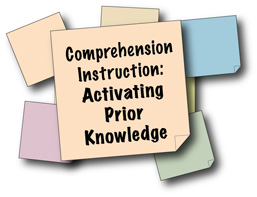What should content-area teachers know about comprehension instruction?
Page 9: Activating Prior Knowledge

Did You Know?
By having students participate in activities or discussions, content-area teachers can identify incomplete, faulty, or conflicting ideas or misconceptions that could interfere with the students’ ability to successfully learn and apply new information.
- Explain the topic or standard about which students will be learning
- Provide an overview of requisite content or concepts (e.g., review preceding content, use media or a hands-on activity to create the necessary context for learning new material)
- Preview the reading material to note headings and subheadings, words in bold or italic font, and titles and captions on graphic sources
- Actively engage students in discussing and integrating information
View the video to see how Anita Archer, an educational consultant, connects the students’ prior knowledge about the term depression to help them to learn about the Great Depression (time: 2:37).
Video is courtesy Anita L. Archer.
Transcript: Connecting Prior Knowledge
Teacher: One more time with enthusiasm, everyone.
Class: The Great Depression!
Teacher: And it occurred in the 19-what, everyone? The 19…
Class: 30’s.
Teacher: You probably already know something about it, but we’re going to particularly look at the causes today, and then later we’ll look at how did the government respond to the Great Depression. Well, first thing is here we have the word depressed, and it is often used to talk about a person’s affect, how they feel and are thinking. So, everybody, show me if you were really depressed, with your body, what you’d look like.
[The class mimics depression.]
Teacher: Okay, show me definitely not-depressed.
[The class is happier.]
Teacher: Okay, show me really depressed.
[The class is really depressed.]
Teacher: Show me not-depressed.
[The class is happier.]
Teacher: Okay, you got to do better on the not-depressed.
[The class laughs.]
Teacher: Okay, show me depressed.
[The class is depressed.]
Teacher: Show me not-depressed. Stay there for the period.
[The class laughs.]
Teacher: Now if I am depressed, my affect, my emotions, the way I feel would they be tend to be good or bad if I was depressed? Which one, everyone?
Class: Bad.
Teacher: Bad. Okay, and if I was depressed, would my emotions be going up or down? Which one, everyone?
Class: Down.
Teacher: Down. So from our own experience of using that term to talk about how people feel, we know that it is not good, but it is…
Class: Bad.
Teacher: It is not going up. It is going…
Class: Down.
Teacher: And you could be in a state, if you were depressed, you could be in a state of…what, everyone?
Class: Depression.
Teacher: Now the term as used in social studies is an economic term to talk about our economy. And when it talks about our economy, let’s use what we already know about depressed. Is the economy good or bad if there’s a depression? Which one?
Class: Bad.
Teacher: Is the economy going up or going down in a depression, everyone? Which one, everyone?
Class: Down.
Teacher: So it is a term that we use commonly, that is used in a economic way. So here we have depression, and it is a long period of…what, everyone?
Class: Time.
Teacher: And it is when the economy is…
Class: Bad.
Teacher: And one of the markers of a depression is many people do not have a…
Class: Job.
(Close this panel)
For those students who do not have the requisite knowledge to take full part in a lesson, teachers might need to provide additional instruction. Listen as Sharon Vaughn discusses some ways to address this issue (time:1:04).

Sharon Vaughn, PhD
Professor of Special Education
Director of the Vaughn Gross Center for Reading and Language Arts
University of Texas, Austin
Transcript: Sharon Vaughn, PhD
The way in which you accelerate comprehension is to assure that students have adequate background knowledge. The best way to build background knowledge is for students to read. The unfortunate cycle is that students who don’t read also have decreased background knowledge, which means that when they read they learn less and remember less. So how do we get them out of this negative cycle and into a positive cycle? Well, one way is by teaching essential words. Another is by promoting reading across the content area, and the third way is by providing enriching background knowledge very quickly through very brief activities such as sixty- and ninety-second videos that quickly provide very important background knowledge that set the tone for the reading.
Activity
List three things Anita Archer does to help students activate their prior knowledge in order to learn the term corporation (time: 3:50).
Video is courtesy Anita L. Archer.
Transcript: Activity
Teacher: With that background knowledge, we’re going to just review some of the critical terms in this. And the first term here is…what, everyone?
Class: Corporation.
Teacher: I need to hear everybody, though. What is it, everyone?
Class: Corporation.
Teacher: There are more than one way we could define this, but as your book uses it they’re talking about a…what, everyone? A…
Class: Large business.
Teacher: Or a…
Class: Company.
Teacher: And so on the back of your page, your second vocabulary term, write down corporation, and then you could write underneath it either one of the synonyms: a large business or a company. Remember, your pencil down always tells me I can go forward. So I took some time just to think about some of the corporations in the United States in 2009. So we have Microsoft, which makes computer…what, everyone?
Class: Software.
Teacher: Dell, which actually builds…
Class: Computers.
Teacher: Walgreens, which is a…
Class: Drugstore.
Teacher: But all of them together form a…what? A…
Class: Corporation.
Teacher: A what, everyone? A…
Class:Class: Corporation.
Teacher: We have Macy’s, which is a…
Class: Clothing store.
Teacher: Circuit City, which just went bankrupt, but makes what, everyone?
Class: Electronics.
Teacher: Or sells electronics. General Motors, which sells…
Class: Cars.
Teacher: And is hoping not to go bankrupt. So those are some of our corporations. Now I want you to think of other corporations that come to your mind. So thinking about some other corporations, large companies. Okay, first ones, then twos, tell your partner the name of another company and as you do it, one’s, I want you to count the number that you and your partner are able to come up with. Come up with another corporation. Talk it over with your partner. First one’s, then two’s. Ones, count the number of ideas. And go.
Students: McDonald’s.
Teacher: McDonald’s, excellent.
Students: KFC.
Teacher: KFC, sure. That’s a corporation. Wal-Mart.
Students: Foot Locker, Journeys, Big Lots.
Teacher: Yeah.
Teacher: Okay, fall silent. One’s, show me the number that you came up with. 10, 5, 7, 4, 5, 4. Okay, we are going to do wraparound or pass. And that means everybody’s going to quickly give an answer, and we are going to wrap around. If you can’t think of one, just say “pass.” But get one in mind now, a major corporation, a large company. Go.
Student: McDonald’s.
Teacher: McDonald’s.
Student: Fries.
Teacher: Say it again.
Student: Fries.
Teacher: Fries.
Student: Goodwill.
Teacher: Goodwill. It is a corporation.
Student: Walmart.
Teacher: Walmart, excellent.
Student: [Inaudible]
Teacher: Good.
Student: [Inaudible]
Teacher: You can say “pass.” Say “pass.”
Student: Pass.
Teacher: Pass.
Student: Best Buy.
Teacher: Yes.
Student: Target.
Teacher: Yes.
Student: Costco.
Teacher: Yes.
Student: Apple.
Student: Pass.
Student: [Inaudible]
Teacher: Right.
Student: [Inaudible]
Student: Walmart.
Student: Starbucks.
Student: JC Penny’s.
Student: [Inaudible]
Teacher: Excellent job, alright!
(Close this panel)
The consultant in this video builds on the students’ background knowledge of corporations by:
- Providing student-friendly definition for the vocabulary word corporation.
- Listing highly visible corporations that they might be familiar with already.
- Asking students to work in pairs to list corporations that they are familiar with.
- Asking individual students to list corporations they know.